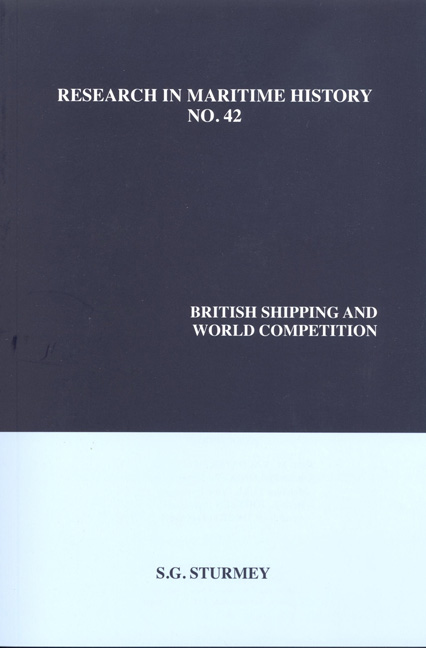Book contents
- Frontmatter
- Table of Contents
- Series Editor's Foreword
- About the Author
- Preface
- Figures and Tables
- Chapter 1 The Problem Defined
- Chapter 2 High Water: The Pre-1914 Period
- Chapter 3 War and Reconstruction
- Chapter 4 The Troubled Years: The Interwar Period
- Chapter 5 Nationalism in Shipping in the Interwar Years
- Chapter 6 The Birth of the Liberty
- Chapter 7 The Prosperous Age: The Postwar Period
- Chapter 8 Enemies of Competition in the Postwar Years
- Chapter 9 Flags of Convenience
- Chapter 10 Economics of Shipping Enterprises
- Chapter 11 Shipowning and Resource Allocation
- Chapter 12 Labour Relations and Labour Costs (by Basil Mogridge)
- Chapter 13 The Conference System
- Chapter 14 The Structure of the British Industry
- Chapter 15 The Question Answered
- Epilogue The Future
- Appendix The Contribution of British Shipping to the Balance of Payments
- Bibliography
- Index
Chapter 11 - Shipowning and Resource Allocation
- Frontmatter
- Table of Contents
- Series Editor's Foreword
- About the Author
- Preface
- Figures and Tables
- Chapter 1 The Problem Defined
- Chapter 2 High Water: The Pre-1914 Period
- Chapter 3 War and Reconstruction
- Chapter 4 The Troubled Years: The Interwar Period
- Chapter 5 Nationalism in Shipping in the Interwar Years
- Chapter 6 The Birth of the Liberty
- Chapter 7 The Prosperous Age: The Postwar Period
- Chapter 8 Enemies of Competition in the Postwar Years
- Chapter 9 Flags of Convenience
- Chapter 10 Economics of Shipping Enterprises
- Chapter 11 Shipowning and Resource Allocation
- Chapter 12 Labour Relations and Labour Costs (by Basil Mogridge)
- Chapter 13 The Conference System
- Chapter 14 The Structure of the British Industry
- Chapter 15 The Question Answered
- Epilogue The Future
- Appendix The Contribution of British Shipping to the Balance of Payments
- Bibliography
- Index
Summary
The object of this chapter is to consider the second condition for expansion, namely, the ability to sell in international competition, where the ability to sell is based on the respective costs of providing the service. As in the preceding chapter, the argument is concerned with both the explanation of the past and the prospects for the future.
It is convenient for the present to assume that shipowners, capital and labour are all drawn from the same economy, but that the capital equipment, the ships, can be bought in the cheapest market. When all, or a substantial proportion, of the shipowners, the capital and the labour are drawn from outside the country in which the ships are registered there is no sense in which the shipping can be regarded as “national.” This, for example, is the position of the flag of convenience fleets.
Classification of Costs
Some items of cost are internationally variable while others may be regarded either as constant for all nations or, if variable, to be variable in a random fashion. Thus, for example, if labour is always national, the wage costs in shipping will vary between nations; fuel prices, on the other hand, vary somewhat throughout the world, but as ocean-going ships have considerable freedom to bunker in the cheapest markets, the variation is random. To avoid confusion with the categories of enterprise costs developed in the previous chapter, those costs which may be regarded as non-variable between nations will be described as international, while those which are variable between nations will be described as national. In table 11.1 the classification in this way is given, together with the enterprise classification of each item from chapter 10. The main difference between the classification of table 11.1 and that of chapter 10 is that capital charges are included in the table. These could be excluded from the classification previously used because the return on capital, loan capital always excepted, is a residual of the operations of a single enterprise. For a nation, however, any industry must consider the return on capital because in the long run it can only continue to employ the existing capital and attract new capital if the return to that capital is no less than could be secured in alternative uses.
- Type
- Chapter
- Information
- British Shipping and World Competition , pp. 223 - 236Publisher: Liverpool University PressPrint publication year: 2009

